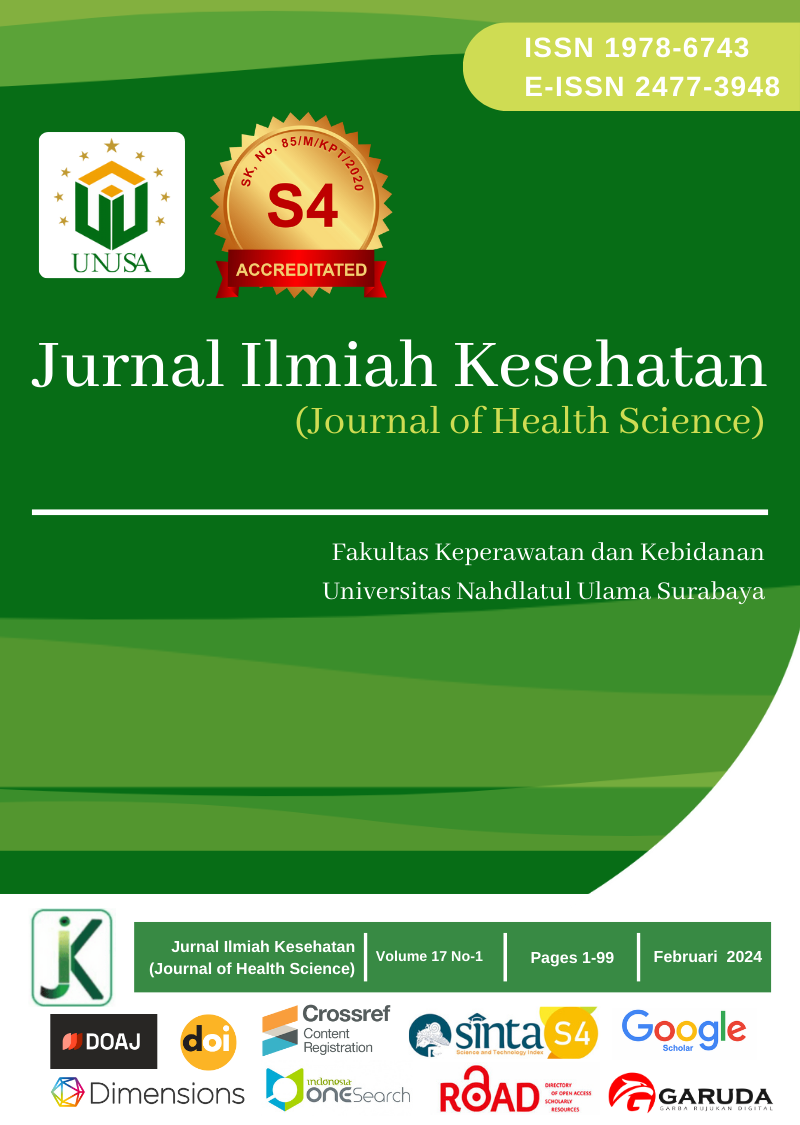The Role of Bay Leaf Extract in Reducing Liver Inflammation in Mice (Mus Musculus) Induced by Potassium Oxonate
Main Article Content
Abstract
Hyperuricemia is characterized by elevated uric acid levels in the blood, often stemming from increased uric acid production or inadequate uric acid excretion, resulting in levels exceeding 7 mg/dL. If left unmanaged, this condition can lead to gout arthritis. Elevated serum uric acid levels have also been linked to liver damage, as evidenced by findings in patients diagnosed with Non-alcoholic fatty liver disease (NAFLD), showing increased serum uric acid levels associated with liver damage. This study investigates the potential role of bay leaf extract in reducing liver inflammation related to uric acid metabolism. This study employed a true experimental approach with a post-test control group design, utilizing 8-week-old Mus musculus as experimental animals. The groups were divided as follows: Group 1 (control), Group 2 (Potassium oxonate-PO), Group 3 (PO with administration of bay leaf extract at 75mg/kg body weight), Group 4 (PO with administration of bay leaf extract at 150mg/kg body weight), and Group 5 (PO with administration of bay leaf extract at 300mg/kg body weight). Histological examination of the liver in the PO administration group revealed cell infiltration compared to the control group. However, a significant reduction in damaged hepatocyte cells was observed by administering bay leaf extract in PO+EDS-1, PO+EDS-2, and PO+EDS-3 groups (P<0.05). Bay leaf extract demonstrates hepatoprotective effects in hyperuricemia induced by potassium oxonate.
Downloads
Article Details
Copyright (c) 2024 Evy Silvia Awwalia, Hotimah Masdan Salim, Mochammad Faishal Riza, Mulyadi Mulyadi

This work is licensed under a Creative Commons Attribution-ShareAlike 4.0 International License.
References
Choi, Y.-J., Shin, H.-S., Choi, H. S., Park, J.-W., Jo, I., Oh, E.-S., Lee, K.-Y., Lee, B.-H., Johnson, R. J.,
& Kang, D.-H. (2014). Uric acid induces fat accumulation via generation of endoplasmic
reticulum stress and SREBP-1c activation in hepatocytes. Laboratory Investigation, 94(10), 1114–
https://doi.org/10.1038/labinvest.2014.98 DOI: https://doi.org/10.1038/labinvest.2014.98
Darussalam, M., & Rukmi, dwi kartika. (2019). The Role Of Boiled Water Of Syzygium Polyanthum
Leaves In Decreasing Hyperuricemia Levels. September.
Dien et al., 2013, Guillermo Garcia-Manero Shao-Qing Kuang, Susan O’Brien, Deborah Thomas, and
Hagop Kantarjian, H. Y., & Jones, R. (2005). 基因的改变NIH Public Access. Bone, 23(1), 1–7.
https://doi.org/10.1002/acr.21773.2012
Harismah, K. and C. (2016). PEMANFAATAN DAUN SALAM (Eugenia polyantha) SEBAGAI OBAT
HERBAL DAN REMPAH PENYEDAP MAKANAN. WARTA LPM, 19(2), 110–118.
Kaneko, K., Aoyagi, Y., Fukuuchi, T., Inazawa, K., & Yamaoka, N. (2014). Total Purine and Purine Base
Content of Common Foodstuffs for Facilitating Nutritional Therapy for Gout and Hyperuricemia.
Biological and Pharmaceutical Bulletin, 37(5), 709–721. https://doi.org/10.1248/bpb.b13-00967 DOI: https://doi.org/10.1248/bpb.b13-00967
Khalid, M., Saeed-ur-Rahman, Bilal, M., & HUANG, D. (2019). Role of flavonoids in plant interactions
with the environment and against human pathogens — A review. Journal of Integrative
Agriculture, 18(1), 211–230. https://doi.org/https://doi.org/10.1016/S2095-3119(19)62555-4 DOI: https://doi.org/10.1016/S2095-3119(19)62555-4
Mardiana, Kartini, A., & Widjasena, B. (2012). Media Medika. Pemberian Cairan Karbohidrat
Elektrolit, Status Hidrasi Dan Kelelahan Pada Pekerja Wanita, 46(14), 6–11.
Muhtadi, Andi Suhendi, Nurcahyanti W., dan E. S. (2012). THE POTENTIAL OF SALAM LEAVES
(Syzigium polyanthum Walp.) AND BLACK CUMIN SEED (Nigella sativa Linn) AS A
CANDIDATE STANDARIZED HERBAL MEDICINE OF URIC ACID. FARMACON, 3(1), 30–
Ningtiyas, I. F., & Ramadhian, M. R. (2016). Efektivitas Ekstrak Daun Salam untuk Menurunkan Kadar
Asam Urat pada Penderita Artritis Gout. Medical Journal of Lampung University, 5(3), 105–110.
Panche, A. N., Diwan, A. D., & Chandra, S. R. (2016). Flavonoids: an overview. Journal of Nutritional
Science, 5, e47–e47. https://doi.org/10.1017/jns.2016.41 DOI: https://doi.org/10.1017/jns.2016.41
Saigal, R., & Agrawal, A. (2015). Pathogenesis and clinical management of gouty arthritis. Journal of
Association of Physicians of India, 63(DECEMBER2015), 56–63.
Salim, H. M., Kurnia, L. F., Bintarti, T. W., Handayani, H., & Shimabukuro, M. (2022). Hepatoprotective
Effects of Methanol Extract of Syzygium polyanthum L. Leaves (Salam) on High Fat Diet.
Tropical Journal of Natural Product Research, 5(12), 2092–2095.
https://doi.org/10.26538/tjnpr/v5i12.8
Sinaga, A. F., Bodhi, W., & Lolo, W. A. (2014). Uji Efek Ekstrak Etanol Daun Salam (Syzygium
polyanthum (Wight .) Walp) Terhadap Penurunan Kadar Asam Urat Diinduksi Potasium Oksonat.
PHARMACON Jurnal Ilmiah Farmasi, 3(2), 141–145.
Tungmunnithum, D., Thongboonyou, A., Pholboon, A., & Yangsabai, A. (2018). Flavonoids and Other
Phenolic Compounds from Medicinal Plants for Pharmaceutical and Medical Aspects: An
Overview. Medicines (Basel, Switzerland), 5(3), 93. https://doi.org/10.3390/medicines5030093 DOI: https://doi.org/10.3390/medicines5030093





